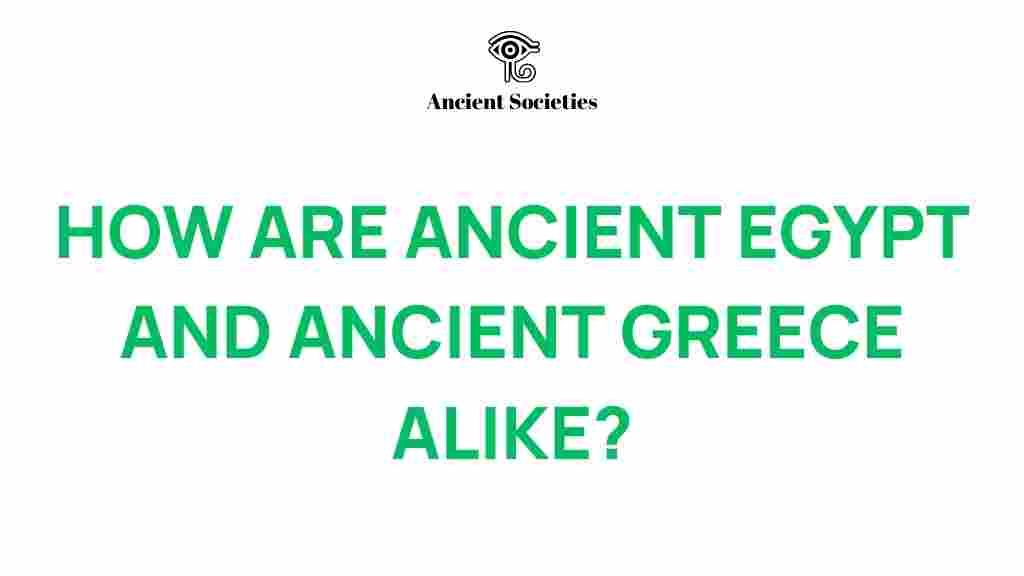Unraveling the Parallels: Ancient Egypt and Greece
Throughout history, two of the most fascinating civilizations that have shaped human culture are Ancient Egypt and Ancient Greece. These two societies, despite being located in different regions and periods, exhibit remarkable parallels in their civilization, culture, mythology, architecture, history, society, and art. In this article, we will explore these similarities and differences, shedding light on how they influenced each other and the modern world.
Introduction to Ancient Egypt and Ancient Greece
The civilizations of Ancient Egypt and Ancient Greece are often studied for their rich contributions to human progress. Ancient Egypt, known for its monumental architecture and intricate religious practices, thrived along the Nile River for over three millennia. In contrast, Ancient Greece, characterized by its city-states and philosophical advancements, laid the foundation for Western civilization. Both cultures have left an indelible mark on art, politics, religion, and science.
The Rise of Civilization
The rise of both Ancient Egypt and Ancient Greece can be traced through their unique developments:
- Ancient Egypt: Emerged around 3100 BC, centered around the Nile, with a focus on agriculture and trade.
- Ancient Greece: Flourished from around 800 BC, characterized by city-states like Athens and Sparta, emphasizing democracy and philosophy.
Cultural Parallels
The cultures of Ancient Egypt and Ancient Greece showcased vibrant practices in religion, art, and societal norms.
Religion and Mythology
Both civilizations held polytheistic beliefs, with deities representing various aspects of life:
- Egyptian Mythology: Featured gods like Ra, the sun god, and Osiris, the god of the afterlife.
- Greek Mythology: Included gods such as Zeus, the ruler of the Olympians, and Athena, the goddess of wisdom.
The myths of both cultures served to explain natural phenomena and moral lessons, influencing their art and literature significantly.
Societal Structure
Both societies had hierarchical structures, though they differed in specifics:
- Ancient Egypt: Society was divided into classes, with the Pharaoh at the top, followed by priests, nobles, and farmers.
- Ancient Greece: Had a more fluid class system, with citizens, non-citizens, and slaves, particularly in city-states like Athens.
Architectural Marvels
The architectural achievements of both civilizations are awe-inspiring and reflect their cultural values:
- Ancient Egypt: Known for its monumental structures like the Pyramids of Giza and the Sphinx, built to honor the gods and preserve the legacy of pharaohs.
- Ancient Greece: Renowned for its temples such as the Parthenon, which exemplified beauty, symmetry, and devotion to the gods.
Both architectures utilized local materials and showcased their respective artistic styles, influencing future generations. For more insights on ancient architecture, visit this resource.
Artistic Expressions
Art in both Ancient Egypt and Ancient Greece was deeply intertwined with their respective religions and societal values:
- Egyptian Art: Focused on the afterlife, featuring sculptures and paintings in tombs that depicted daily life and spiritual beliefs.
- Greek Art: Emphasized humanism, proportion, and realism, with notable works like statues of gods and athletes that celebrated the human form.
Both cultures used art as a means of communication, telling stories of their gods, heroes, and the human experience.
Philosophy and Science
The intellectual pursuits of both civilizations laid the groundwork for future advancements:
- Ancient Egypt: Contributed to mathematics and medicine, with texts like the Edwin Smith Papyrus detailing surgical practices.
- Ancient Greece: Pioneered philosophy with thinkers like Socrates, Plato, and Aristotle, who explored ethics, politics, and metaphysics.
The blend of Egyptian knowledge and Greek philosophy influenced many aspects of modern science and thought.
Similarities and Differences
While there are many parallels between Ancient Egypt and Ancient Greece, their differences also define their unique identities:
- Political Systems: Egypt was a theocratic monarchy, while Greece practiced various forms of governance, including democracy.
- Views on Life and Death: Egyptians focused heavily on the afterlife, while Greeks emphasized the importance of living a virtuous life.
Influence on Modern Society
The legacies of both Ancient Egypt and Ancient Greece continue to influence contemporary culture:
- Art and Architecture: Many modern buildings and artworks draw inspiration from these ancient civilizations.
- Philosophy and Education: Greek philosophers laid the groundwork for Western education and critical thinking.
By studying these ancient civilizations, we gain insights into our own society and culture, appreciating the rich tapestry of human history.
Troubleshooting Tips for Understanding Ancient Civilizations
Understanding the complexities of Ancient Egypt and Ancient Greece can be challenging. Here are some tips:
- Do Your Research: Utilize reliable sources, including books and academic journals, to gain a deeper understanding of these civilizations.
- Visit Museums: Explore museums with Egyptian and Greek artifacts to see history come alive.
- Engage in Discussions: Join forums or groups focused on ancient history to exchange ideas and perspectives.
- Watch Documentaries: Educational documentaries can provide visual context and insights into ancient cultures.
Conclusion
In conclusion, the exploration of Ancient Egypt and Ancient Greece reveals a rich tapestry of civilization, culture, mythology, architecture, history, society, and art. While they arose in different contexts, the parallels between these two great civilizations illustrate the interconnectedness of human history. Understanding their contributions allows us to appreciate the foundations of modern society. As we delve into the past, we recognize that these ancient cultures continue to shape our world today.
For more information on ancient civilizations and their impacts, feel free to visit this link.
This article is in the category History and created by AncientSocieties Team
